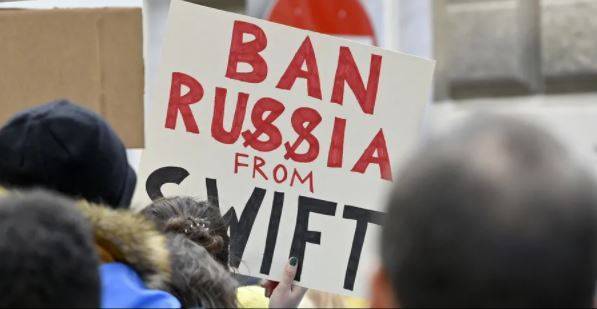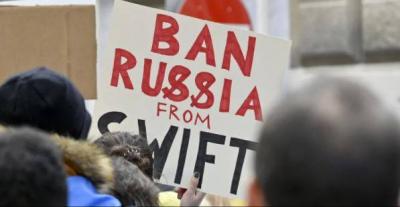The option of excluding Russia from the SWIFT banking financial transactions system remains on the table for the West and the United States amid escalating tensions with Russia following its invasion of Ukraine. However, this weapon is "fraught with risks" regarding potential repercussions that may also affect European countries with extensive economic ties to Moscow. While European officials emphasized on Friday the need to exclude Russia from SWIFT as a punitive measure, U.S. President Joe Biden stated that this step, which is "still an option," currently lacks consensus among Europeans, indicating disagreements among European nations about this decision.
The decision faces particular German concerns; while Berlin does not oppose it, it has mentioned that it is "considering the consequences." With further skepticism about the efficacy of such a move, German Chancellor Olaf Scholz stated that excluding Russia from SWIFT should not be part of the sanctions package against Russia. Other countries, like France and Britain, have expressed their support for the decision.
So, what is the SWIFT system, and what are the potential effects on Russia if a decision is made to exclude it? How would these repercussions extend to Europe, and are there financial alternatives to it? Economic expert Suleiman Al-Assaf spoke in a special statement to Sky News Arabia about the significance of the SWIFT system, which was established in 1973 and began its activities in 1977, in light of the rapid growth of global trade.
The system provides significant advantages, especially regarding transaction protection and execution speed, and it is less costly than other transfer methods. Furthermore, it encompasses over 200 countries and thousands of financial institutions and banks (11,507 institutions as of March 2020). The SWIFT system matches client orders among the entities involved in financial transactions, authenticating them as in monetary transfers for both operations and financial settlements, as well as validating the execution and settlement of trades among participating parties.
According to Al-Assaf, "When a country is excluded from the SWIFT system, its financial movement becomes extremely difficult, and it cannot transfer or receive funds, which affects import and export operations and various economic activities."
Difficult Consequences
If Russia were to be excluded from the SWIFT system, it would mean "the impossibility of sending money to it, putting Russian companies and their clients— including Europeans— in a widespread crisis that would also impact energy exports." SWIFT (Society for Worldwide Interbank Financial Telecommunication) allows for the connection and exchange of messages and information across all financial markets through the banks responsible for executing those transactions in different countries. It covers various financial and banking operations conducted between banks and financial institutions.
The economic expert pointed out that excluding countries from the SWIFT system— as was previously done with Iran, which suffered enormous losses— represents an economic pressure tool with severe implications for the economic situation and currency. This is a measure being considered against Russia in light of recent developments that come with a range of economic consequences at various levels.
Iran suffered from its exclusion from the SWIFT system in 2012 due to tightened international sanctions related to its nuclear program, leading to Tehran losing half of its oil export revenues and as much as 30 percent of its foreign trade, according to statistics from the Carnegie Moscow Center for Research. According to the Russian expert center Realist, "Russia may consider any exclusion from the SWIFT payment system as a declaration of war and could respond militarily."
The German Position
The CEO of the Korum Center for Strategic Studies in London, Tarek Al-Rifai, commented in a special statement to Sky News Arabia, saying: "Excluding Russia from the SWIFT network remains a proposed Western option, but it faces internal disagreements in Europe, particularly from some powers—especially Germany—against separating Moscow."
Al-Rifai noted that the plan to separate Russia from the system seems ready, while facing German objections amid the strong and extensive economic relations between Russia and Germany, as well as the large volume of trade between the two countries, which consequently hinders Berlin's stance on the decision.
At the same time, the economic expert pointed out that "Russia has been aware of this since it entered Ukraine in 2014 and has begun preparing alternatives related to a new system as a replacement for SWIFT."
A Russian Alternative System
This Russian system, which has been under development since 2014, is known as SPFS (System for Transfer of Financial Messages) and was adopted by the Russian Central Bank in 2017 as a substitute for SWIFT. Russia has also prepared its own internet network.
Russian Security Council Deputy Chairman Dmitry Medvedev commented weeks ago on the Western threats to exclude Moscow from the SWIFT network, saying: "They keep intimidating us with this, which drove us to create our own system for transferring information in anticipation of emergencies... The same thing can happen with the internet."




